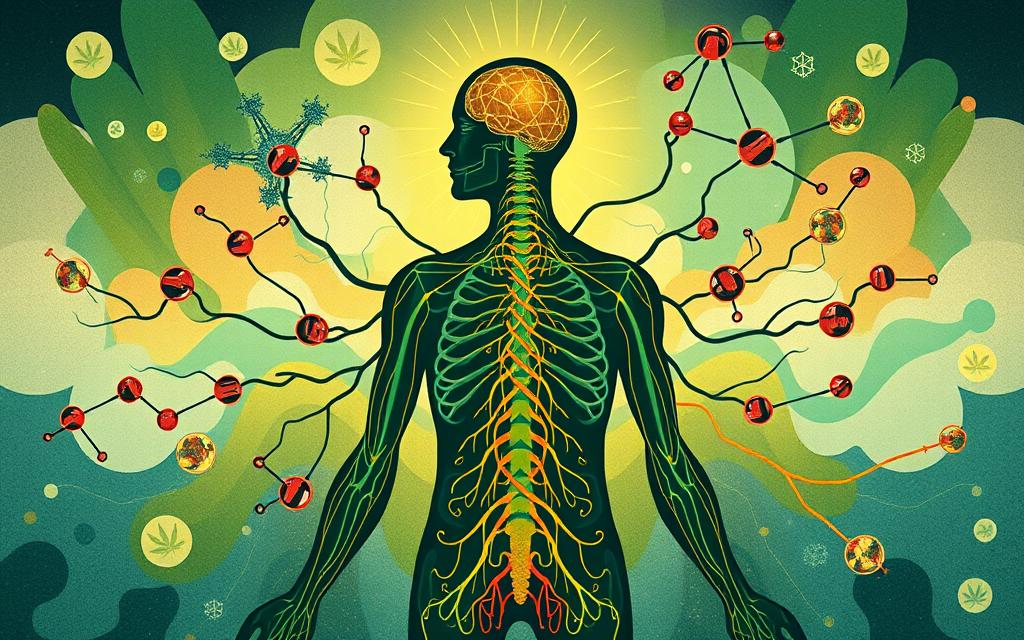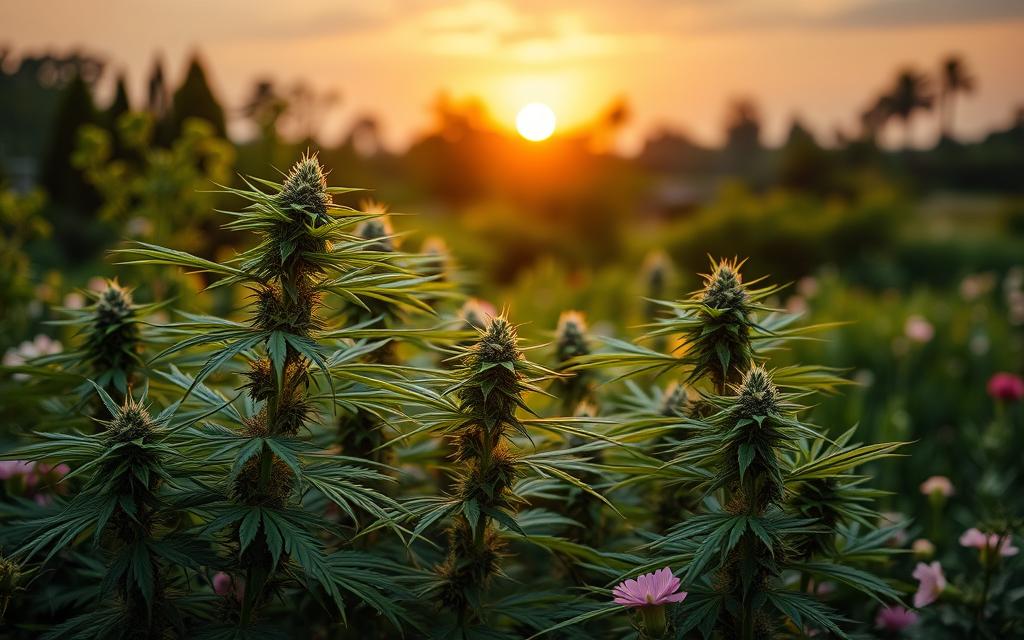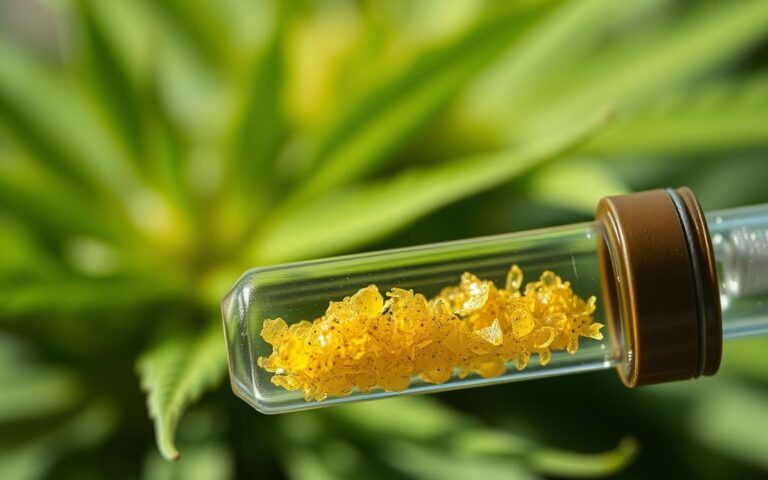Effectiveness of Cannabis in Treating Depression
Studying how cannabis can treat depression is getting a lot of focus. Researchers, doctors, and folks living with depression are all paying attention. With depression affecting over 300 million people globally, finding good treatments is critical. As more places make medicinal cannabis legal, it’s being looked at as a possible help.
Many people who use medical cannabis say they do it to ease depression. The ingredients in cannabis, like THC and CBD, are key to its potential effects. There’s a change in how we view these compounds, especially as research shows they might improve mood and lessen anxiety and depression symptoms.
Although we’re still learning, early research brings hope. People with depression who use medical marijuana tend to feel better than those who don’t use it. This article explores how cannabis might help or harm as a depression treatment. We aim to offer a clear view of its role for people seeking relief.
Understanding Depression and Its Impact
Depression is a major global health issue. Global depression statistics show that around 350 million people are affected worldwide. It’s now seen as a top cause of disability. This has sparked important talks on effects of depression and the need to focus on mental health issues.
Prevalence of Depression Globally
Depression is now known as a common mental health problem, leading to more awareness and study. The World Health Organisation says its wide reach shows how urgent effective treatments are needed. It affects not just those with the condition but also their families, workplaces, and communities.
Depression Symptoms and Their Effects on Daily Life
Depression’s main signs are constant sadness, losing interest in things once loved, and feeling very tired. Trouble focusing can make these worse. These issues can really mess up someone’s daily life, affecting work, relationships, and happiness. It shows why managing depression well is so crucial.
Current Treatment Options for Depression
There are many ways to tackle treatment for depression. Drugs, especially SSRIs, are often used. Talking therapies, changing how you live, and support groups are key too. Still, not everyone gets the help they need. It shows a big issue remains in mental health care.
| Treatment Methods | Effectiveness | Common Side Effects |
|---|---|---|
| SSRIs | Moderate | Nausea, insomnia, weight gain |
| Psychotherapy | High | Emotional discomfort, time commitment |
| Lifestyle Modifications | Variable | Adjustment challenges |
Fundamentals of Cannabis and Its Components
Cannabis is getting more attention for its parts and how they help mental health. By learning about THC and CBD, we get to know how they work in our bodies. This helps us understand cannabis’s effect on the endocannabinoid system, which is important for our well-being.
Cannabinoids Explained: THC and CBD
Cannabis is made up of cannabinoids that act on our brain and body. THC is the part that makes you feel high. CBD, on the other hand, is known for its health benefits without making you high. Studies show CBD might help with depression, making cannabis a complex tool for mood problems.
How Cannabis Interacts with the Body’s Endocannabinoid System
The endocannabinoid system plays a big role in managing our mood and stress. Cannabinoids like THC and CBD link to this system, changing how we feel. By balancing the endocannabinoid system, cannabis could help with depression. More research could uncover how cannabis improves mental health. For more on how plant care affects cannabis, check out this article.

Does Cannabis Treat Depression? A Closer Look
Talking about cannabis for depression needs a deep look into what studies show. Research tells us that cannabis might change how we feel when we’re depressed. This highlights how complex its effects on our mind are.
Clinical Evidence and Research Findings
Studies have found that cannabis-based medicines can really help lessen depression. Take, for instance, an experiment with 129 people. They felt better after one, three, and six months of treatment. They not only felt less sad but also slept better and were less anxious. But, there are still questions left unanswered by these studies. More research on cannabis is being done to understand it better.
Short-term Relief vs Long-term Effects
Some people say they feel better right after using cannabis. This quick fix is attractive to those in need of fast relief. However, using it a lot for a long time might not be good, especially for young people and those who use it heavily. These groups might end up feeling more depressed over time. This shows we need more studies to really know if cannabis helps or hurts in the long run.
| Aspect | Short-term Benefits | Long-term Risks |
|---|---|---|
| Symptom Relief | Rapid alleviation of depression symptoms reported. | Potential exacerbation of depressive symptoms with continued use. |
| Anxiety and Sleep | Improvement noted in anxiety and sleep quality. | Risk of developing dependence and withdrawal symptoms upon cessation. |
| Causality | Initial findings support potential efficacy. | Unclear causal relationship and mental health implications in heavy users. |
Potential Benefits of Cannabis for Mental Health
The exploration of cannabis for mental health benefits has gained traction recently. Researchers and users are intrigued by its potential. It could help with symptoms of various mental disorders. Let’s look into how cannabis might help improve mental health.
Reduction in Symptoms of Depression
Many people say cannabis has improved their mood. Especially CBD is known to help with depression. It provides quick relief for about 95% of users. This suggests cannabis could be an effective depression treatment.
Impact on Anxiety and Sleep Quality
Cannabis is turning into a go-to for those seeking anxiety relief and better sleep. Certain cannabinoids are shown to help with sleep, especially for those who are anxious. Better sleep is essential for good mental health. This shows cannabis’s potential in improving anxiety and sleep issues.
User Experiences and Anecdotal Evidence
User stories provide insight into cannabis’s effectiveness for mental health. Many see it as a good option for managing depression and anxiety. While these stories are powerful, we also need scientific research for a full picture.
| Aspect | User Feedback |
|---|---|
| Depressive Symptoms Relief | 95% report rapid mood improvement |
| Anxiety Relief | Enhanced calmness with cannabis use |
| Sleep Quality | Users experience better sleep patterns |
| User Testimonials | Personal success stories highlight cannabis as a management tool |
Risks and Considerations of Cannabis Use for Depression
The link between cannabis and depression is complex. It sparks big worries about using it to treat depression. Knowing the risks of cannabis is key for those thinking of using it for their mental health. Though some look for quick relief, it’s important to think carefully about the risks.
Short-term vs Long-term Risks
People seeking fast benefits from cannabis might not see the risks. Long-term use effects can make depression worse, lower motivation, and lead to self-medication. This means not getting professional help. Studies show that using marijuana without a medical reason is linked to more thoughts of suicide and poorer mental health.
Potential for Increased Symptoms and Dependency
Studies tell us that regular use of cannabis can lead to dependency. About one in ten users get addicted. Heavy users often feel more anxious and depressed. This is especially true for teenagers. Starting to use cannabis early can increase the chance of serious mental health issues, like schizophrenia. If you’re already at risk for mental health problems, cannabis might make things worse.
Importance of Medical Supervision
Getting medical advice is key when using cannabis for depression. Working closely with doctors is crucial to make a plan that’s safe and right for you. Talking openly about using cannabis means you get the help you need. It leads to the best approach to manage your symptoms. For more insight, check this review of cannabis and depression.
| Risk Factor | Short-term Effects | Long-term Effects |
|---|---|---|
| Dependency | Increased cravings | Development of dependency issues |
| Depressive Symptoms | Worsened mood | Persistent depressive episodes |
| Anxiety | Heightened anxiety | Chronic anxiety disorders |
| Cognitive Impairments | Difficulty concentrating | Small but permanent effects on cognition |
Conclusion
The subject of using cannabis to treat depression is complex and changing. Some people find relief in cannabis flower but there are risks too. Almost 20% of adults in the U.S. face depression, making the search for effective treatments critical.
A detailed review looked at outcomes from 1,819 individuals using cannabis for depression. On average, there was a noticeable drop in symptoms. Yet, it’s important to know that 1 in 5 might feel worse, experiencing motivation loss, especially with high-THC cannabis.
Future studies on cannabis are essential. They will help us understand its full effects, including how it might help or harm mental health over time. For those considering cannabis for depression, moving forward cautiously and combining it with proven therapies is key. For more information on cannabis, including its effects on digestive health and risks like diarrhea, further study is important. Check out this link for more details.
FAQ
What is the role of cannabis in treating depression?
Cannabis might help some people with depression. THC and CBD from the plant interact with our body’s mood system. But, we still need to learn more. Always ask doctors for advice tailored to you.
How prevalent is depression globally?
Worldwide, around 350 million people face depression. The World Health Organisation says it’s a major cause of disability. This shows the urgent need for good treatments.
What are the common symptoms of depression?
Depression symptoms include feeling very sad, losing interest in fun, feeling tired, and having trouble thinking. These symptoms can change how one works, enjoys life, and interacts with others.
Can you explain the difference between THC and CBD?
THC causes the high from cannabis. CBD doesn’t make you high and might help with mental health. Researchers are looking into CBD for treating health issues, especially depression.
What is the endocannabinoid system?
Our endocannabinoid system helps keep the body balanced. Cannabis compounds can attach to parts of this system. They might affect your mood and stress, possibly easing depression.
What does current research say about cannabis and depression?
Early studies show cannabis-based products might reduce depression symptoms. Users have felt better after 1, 3, and 6 months. But, we need more research to be sure.
Are there risks associated with cannabis use for depression?
Using cannabis has risks. Some find short-term relief. Yet, it can make symptoms worse over time, cause motivation loss, and risk dependency, especially if used often.
How can cannabis affect anxiety and sleep quality?
Cannabis might help with anxiety and make sleep better for some. Research is finding that it could lead to improved sleep, especially for those with anxiety.
Why is medical supervision important when using cannabis for depression?
Doctors should oversee using cannabis for depression. They make sure the treatment is safe and right for you, considering your health and other factors.
What future research is needed regarding cannabis and depression?
We need more studies on how cannabis affects depression long-term. This research will guide its medical use, aiming for safe, effective care for everyone.










